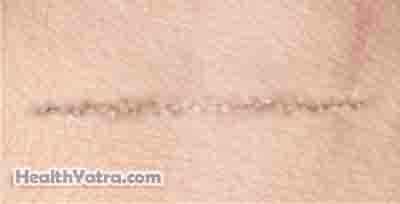Definition
A keloid is an extra growth of scar tissue over a skin wound. It grows beyond the margins of the skin wound. A keloid can vary in size from one to several inches. They are not harmful to general health.
Keloids can occur anywhere but they are more common on:
- Earlobes
- Shoulders
- Upper back
- Chest
- Back of scalp and neck
Causes
Scar tissue is a part of the normal healing process. With keloids, the scar tissue grows in an uncontrolled manner. The scar continues to grow even after the wound has been covered. The growth can continue for weeks or months.
Risk Factors
Keloids are more common in people with African American, Asian, or Hispanic ethnicity. They are also more likely to occur between 10-30 years old.
Factors that increase your chance of keloids include:
- Deep skin wounds, such as those from burns or surgical scars
- Scars from acne, vaccinations, or chickenpox
- Family history

Symptoms
Keloids often begin as small lumps at the site of a skin injury. They gradually grow beyond the edges of the wound.
For most, the scar is the only symptom. Some may have other symptoms such as:
- Pain
- Burning
- Itchiness
- Tenderness
Diagnosis
Your doctor will ask about your symptoms and medical history. A physical exam will be done.
You may be referred to a skin specialist. They can confirm the diagnosis and assist in removal. A plastic surgeon may do the removal.
Your doctor may order a biopsy. This test will rule out other problems like a tumor or other skin disorders.
Treatment
Some keloids may go away on their own, but this is rare. If the keloid is not bothersome it does not need to be treated.
A large or irritating keloid may be removed with surgery. Most keloids will grow again after surgery. Other treatments may help to prevent recurrence. Prevention treatment options include:
Corticosteroid Injections
These injections are often given with surgery. They are repeated every 3-4 weeks for six months. Steroids can relieve itching and pain and slow the scar formation. For some it may cause some shrinking of the keloid.
Radiation Therapy
Your doctor may recommend radiation after surgery. This therapy can be very successful at stopping regrowth. However, it is a limited option because it is toxic to healthy tissue.
Other Medications
Other medications that may also help prevent regrowth of keloid after surgery include:
- Verpamil—injected directly into area.
- Fluorouracil —injected directly into area.
- Imiquimod —cream applied to the affected area.
Prevention
To help reduce your chances of forming a keloid, take the following steps:
- Avoid trauma to the skin.
- Immediately care for cuts or scrapes.
- Avoid cosmetic surgery that is not necessary for health.
- Do not tattoo or pierce your ears or other areas of the body.
